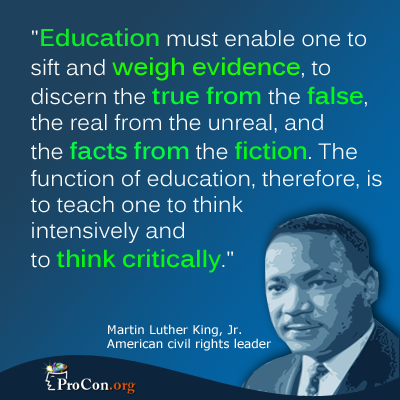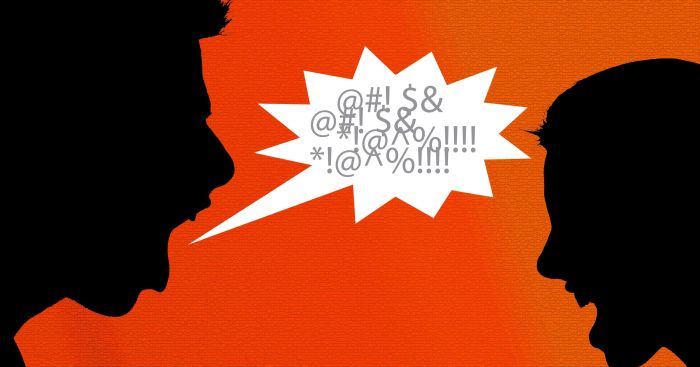None will grasp the message but men of intellect? Quran (2:269)
Most certainly the worst of animals in God’s sight are the deaf, the dumb who do not use their brains. Quran (8:22)
Behold in the creation of the heavens and the alteration of night and day, there are indeed signs for men of intellect. Quran (3:190)
Critical Thinking—What Education Must Be All About!
According to Wikipedia “Education is the process of facilitating learning, or the acquisition of knowledge, skills, values, beliefs, and habits.”1
As an educator, I asked myself: What is the purpose of education? I find the answer to be elusive and varies according to each and every teacher. No matter what the curriculum, every teacher has a vision and a goal based on his/her belief and/or agenda, and will wield the curriculum to implement this vision into the minds and hearts of the students.
What Is the Purpose of Education?
“What is the purpose of education? This question agitates scholars, teachers, statesmen, every group, in fact, of thoughtful men and women,” Eleanor Roosevelt wrote in the 1930 article, “Good Citizenship: The Purpose of Education,” inPictorial Review.
If you were to ask even a relatively small group of teachers, administrators, students, parents, community members, business leaders, and policymakers to address the question of purpose, how difficult do you think it would be to reach a consensus?
You might have better luck asking, “What is the meaning of life?
In the United States, historically, the purpose of education has evolved according to the needs of society. Education’s primary purpose has ranged from instructing youth in religious doctrine, to preparing them to live in a democracy, to assimilating immigrants into mainstream society, to preparing workers for the industrialized 20th century workplace.
And now, as educators prepare young people for their futures in a world that is rapidly changing, what is the goal? To create adults who can compete in a global economy? To create lifelong learners? To create emotionally healthy adults who can engage in meaningful relationships?”
(Source)
The Golden Key—Critical Thinking
Regardless of the various goals and purposes of education and the numerous curriculum—the basic purpose behind it all is to prepare the individual to obtain knowledge to serve his/her goals of success in this world.
“The most significant skill [young people] can develop in the 21st century is the same skill that served them well in prior centuries: a mind equipped to think, the most important work skill of them all.”
(Source)

Critical Thinking—Definition
Making reason judgments that are logical and well thought out.
“Disciplined thinking that is clear, rational, open-minded, and informed by evidence.” (Dictionary.com)
A Definition
“Critical thinking is that mode of thinking — about any subject, content, or problem — in which the thinker improves the quality of his or her thinking by skillfully analyzing, assessing, and reconstructing it. Critical thinking is self-directed, self-disciplined, self-monitored, and self-corrective thinking. It presupposes assent to rigorous standards of excellence and mindful command of their use. It entails effective communication and problem-solving abilities, as well as a commitment to overcome our native egocentrism and sociocentrism.”3
(Source)
Why is critical thinking important?
The internet has brought the world closer, and in order to achieve success in the modern world, one has to acquire the skills to deal with multiple cultures and a vast array of social, political, and religious backgrounds.
“The Problem
Everyone thinks. It is our nature to do so. But much of our thinking, left to itself, is biased, distorted, partial, uninformed, or downright prejudiced. Yet, the quality of our life and that of what we produce, make, or build depends precisely on the quality of our thought. Shoddy thinking is costly, both in money and in quality of life. Excellence in thought, however, must be systematically cultivated.”3
http://www.criticalthinking.org/pages/our-concept-of-critical-thinking/411
Education should enable the learner, the student, to be valuable to his/her environment and community in order to achieve his/her goals. An educated person should have the cognitive skills for decision making. Researches have been made to find out how to develop and improve these cognitive skills through the learning process.
“Anne Helsdingen from the Open University of the Netherlands and her colleagues studied an interesting issue about critical thinking in decision making. They wanted to know whether teaching critical thinking skills can improve judgment and decision making in general.
Helsdingen and her team define critical thinking as reasoned thinking with a purpose. They also describe some core critical thinking skills and abilities, such as being able to:
• Appreciate that your own opinions may be wrong
• Accept statements as true even when they conflict with your own views
• Temporarily adopt an initial position with which you disagree, and then reason from that starting point”4
(Source)
A successful individual is not the one who has the most information- google can achieve that by a click of a mouse- rather, it is the individual who has the critical thinking to reach the right decision to achieve his/her goal or the goal of the company one represents.
According to Health and Physical Education Online:
” Importance of critical thinking
Health and Physical Education in the New Zealand Curriculum (1999) defines critical thinking as “examining, questioning, evaluating, and challenging taken-for-granted assumptions about issues and practices” and critical action as “action based on critical thinking” (page 56).
By adopting this definition of critical thinking and applying their learning in education contexts, students can:
• become broad and adventurous thinkers
• generate innovative solutions
• use their reasoning skills to analyze and evaluate
• plan and think strategically”5
(Source)
It is important for educators and curriculum developers to create curriculum that encourages and implements the cognitive skills for critical thinking and decision making. The global society would benefit from such educated individuals with the broad mind and the professional skills for the betterment of their societies and for the goodness of humanity in general.

“Logical reasoning and critical thinking techniques have many positive effects, including:
• Improved cognitive skills;
• A foundation of logical decision making on which you can draw, even in stressful situations; and,
• Higher academic and professional achievement.” 6
(Source)
Critical Thinking is Essential Tool in The Learning Process:
“For students, learning to think critically and to take critical action will include:
• learning to take responsibility for analyzing and evaluating information
• giving each other feedback about their analyses, evaluations, and actions
• questioning and challenging each other’s assumptions in a non-threatening manner
• learning to identify any inequalities and power relationships within contexts in health education, physical education, and home economics, focusing on how these positions are sometimes reinforced through organizational structures and through certain forms of language
• reflecting on people’s assumptions, beliefs, and behaviors, taking into account a range of factors
• generating alternative solutions and accepting them or critiquing them in a sensitive manner
• developing the confidence to work with others in taking critical action
(The list above is based on Smyth (2000), page 507.)” 5
(Source)
The Objectives of Critical Thinking:
“A well-cultivated critical thinker:
Raises vital questions and problems, formulating them clearly and precisely
Gathers and assesses relevant information, using abstract ideas to interpret it effectively
Comes to well-reasoned conclusions and solutions, testing them against relevant criteria and standards
Thinks open-mindedly within alternative systems of thought, recognizing and assessing, as needs be, their assumptions, implications, and practical consequences
Communicates effectively with others in figuring out solutions to complex problems.”3
(Source)
Conclusion:
“Critical thinking will teach you an entirely new way to look at the world and can do wonders for your abilities as a problem solver! As a critical thinker, you’ll be better equipped to face the challenges presented by an ever changing world and you’ll be well served in both your personal and professional life.”7
(Source)
©Gainperspectiveblog

















































